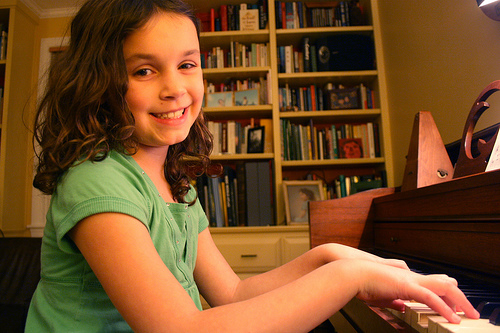 I apologize for being a bit MIA around the blog lately. I have a couple of projects that I am working on right now for my local MTNA association. One of them is designing a website. It’s about half-way done and if you’re interested in taking a sneak peek, you can click here to see it. 🙂
I apologize for being a bit MIA around the blog lately. I have a couple of projects that I am working on right now for my local MTNA association. One of them is designing a website. It’s about half-way done and if you’re interested in taking a sneak peek, you can click here to see it. 🙂
Anyway, our last Forum Q&A was a discussion about accepting and then teaching adult students at the students’ homes. We also hit on a few other situations, like females teaching male adult students at the teacher’s home. There was a good overall consensus about handling such situations. It’s so great to get advice and support from others, so thank you all for your contributions to the discussion! (As always, it’s never too late to comment if you haven’t already!)
Here’s the question for today:
What is the ideal role for the parents when it comes to piano lessons? If a parent asks about what they can be doing to help and support their child, what is your answer? Do you require or encourage parents to sit in on lessons? Do you require parents to help young beginners practice? Do you hold yearly or semesterly meetings with parents to discuss progress?
Leave your thoughts in the comments below.
Photo Credit: woodleywonderworks | CC 2.0



I noticed that nobody has commented on this blog post yet so I thought I would take a stab. title=”Piano World”> recently had a thread about it with lots of heated debate!
My personal philosophy on this is fairly simple and to the point.
Can the parent any longer help the child at home or does the child need parental assistance in understanding the basics while at home practicing? Then absolutely, the parent should be involved during the lesson. But not to interfere or try to ‘overrule’ you in any sense, but to be a cheerleader at times and a wall fly at every other time – Simply taking notes and observing.
Is the child embarrassed to have the parent sitting in or tense / nervous in a noticeable way? I know that I NEVER wanted my parents to sit in the lessons. I couldn’t think when my father was sitting close by for my own personal reasons, but the truth is, some children are afraid or intimidated by their parents. Or embarrassed as mentioned above. There is no reason a teenager needs a parent to sit in, but I allow them too anyway if they are supportive and I feel the child / parent relationship is positive.
Why would you NOT want the parent to sit in if they are only there to support and help their child at home? I don’t know, but apparently some in the Piano World thread above seem to think otherwise.
Maybe this will get a conversation started!
what the!? I can’t seem to edit my above post and I didn’t expect THAT to happen.
Sorry!
This really depends on the student. I teach all ages. I have a 13-yr-old boy who likes for his mom to sit in on lessons just because it’s kind of bonding time for them. He’s one of 9 children, and that hour with just him and his mom and his piano teacher in one room is a luxury to him. That’s definitely an exception to any “rule”, though.
With my very young students (ages 4-7), I think it is ideal for the parent to sit in on lessons. These students require guided practice at home, and the parents can guide them better if they attend the lesson. However…. children of this age commonly have difficulty knowing which adult to assign authority to. Some students simply cannot focus on their lesson and following the teacher’s instruction if a parent is in the room. If students are this young, I am very straightforward with the parent…..absolutely NO cell phone use (not even texting or games); absolutely no input into the lesson unless I request it; they must allow me to do all correction, both of piano-related skills and of behavior. If I find that I just can’t get full cooperation of the student and/or the parent with the parent in the room, I will gently request that we try lessons without the parent in the room. Many times, a good alternative is asking the parent to sit outside the room with the door left open, so they can hear.
With students around 7-12 years old, I ask that the parent at least read the assignment sheet every week, so they are aware of what the child should be working on every day. The younger the student, the more detailed I am about what I expect…..and the more I expect the parent to supervise practice time (just as they would math homework after school).
Middle school and beyond, they student should be pretty independent. They read well enough to understand their assignment. Many times, they know more about music than their parents. And they are old enough to take responsibility for themselves. But I do keep the parent informed of their progress, and of any concerns I might have.
I don’t hold meetings with the parents, but I do send out occasional newsletters. However, my biggest form of parent communication is in the lesson itself. Two-thirds of my students have parents sitting in. Honestly, I think that the biggest reason is that I have a nice, comfy couch in the studio, and it’s more comfortable than the car! I almost never have parents interrupt the lesson or distract us, so I only address that problem if it arises. The student’s back is to the couch, making it less likely that they will be tempted to interact with the parent. Also, I only accept students who are 6 or older, so they’re pretty comfortable with recognizing me as the teacher. I really find the parent’s presence to be beneficial, and having them there addresses all of the questions you post. The parents have a better understanding of our goals and the work necessary to reach them. They pay more attention to things like bench height and hand position after they’ve seen me emphasize them in the lesson. They’re more conscious of upcoming performances or evaluations and the work that goes into preparing for them. Honestly, I wish all my parents could sit in.
I created a ‘Piano Parent Responsibilities’ handout about this for a piano parent workshop we hosted at the store, and then posted it on our parenting blog along with some thoughts from my presentation. This might be helpful: http://pianoparenting.blogspot.com/2011/09/responsibilities-of-piano-parent.html
I love this, Valerie! I am going to consider the possibility of a a mandatory parents’ meeting at my studio at least once a semester. That is a wonderful idea that would deal with many issues right up front! We have 14 teachers at our studio, and I’m confident that not all of our teachers address these things with the parents the way that I do when a new students starts lessons.
Parents must be involved in piano lessons. Teachers must learn how to balance how much parents are involved depends on the personality and family dynamics of each family. Some teachers spend 2-4 minutes after a lesson briefing parents on what the student has learned during lessons and what they should work on each week. Other teachers allow parents to sit in on every lesson.